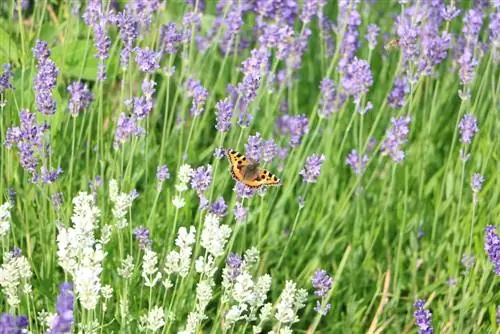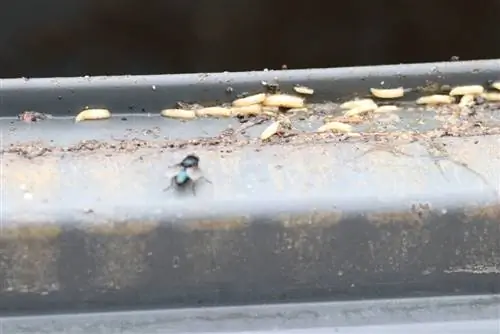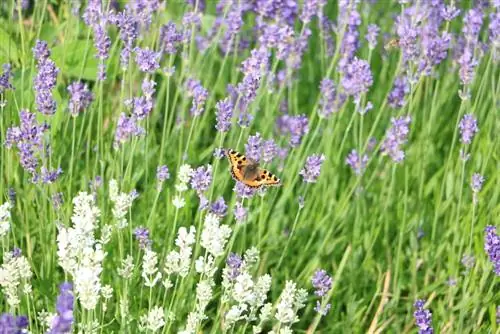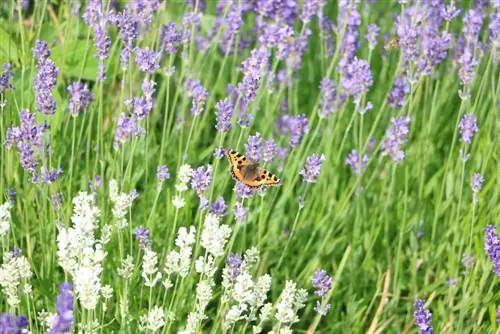- Author admin caroline@plants-knowledge.com.
- Public 2023-12-17 03:39.
- Last modified 2025-06-01 06:48.
Aromatically fragrant, colorful and romantic - lavender is one of the most popular aromatic plants in the local green area. But the decorative plant is not only used as a visual highlight in the garden, but is also said to repel insects such as ticks and wasps. A certain effect of the plant has now been proven, which is primarily based on the essential oils it contains. But the application does not always lead to the desired effect.
Lavender - ingredients and cultivation
In many areas in Germany, ticks and wasps have become a real plague. However, anyone who cultivates their garden predominantly organically does not necessarily want to use only chemical pesticides to combat ticks; Various scented plants are available as herbal alternatives. These include:
- Narrow-leaved lavender
- Catnip
- Rosemary
- tansy
The evergreen lavender in particular exudes an intense scent that keeps ticks away. The various essential oils contained in the plant are responsible for this strong, aromatic scent. The specific effect is achieved primarily by cineole, camphor and linaol. The petals of the lavender plant vary from silver gray to white to pink and purple.
Lavender is best grown in slightly alkaline soil that has a pH between 6.5 and 7.5. In addition, the substrate used should have high permeability and not be prone to waterlogging. Lavender blooms in a sunny location and can withstand temporary drought. For more beautiful growth, it is worth cutting back the plant in spring.
Tip:
It has proven useful to plant lavender in combination with other insect-repelling herbs; In this way, ticks are confronted with several unpleasant smells, which add up their effect.
Nicely arranged on the balcony or in the garden, lavender has decorative effects in addition to its insect-repelling properties.
Lavender as an essential oil
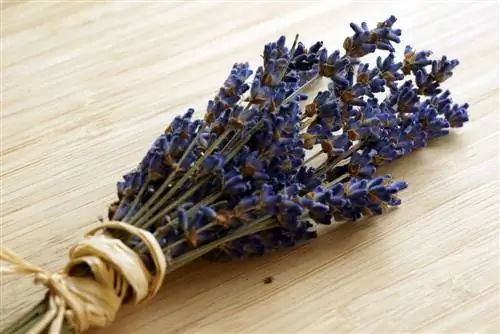
As early as the Middle Ages, lavender flowers were scattered on the floors and lavender bouquets were placed in cupboards to keep vermin away. Today, lavender is mainly offered in processed form to combat ticks and wasps - especially as an essential oil. The product proves to be particularly effective as an anti-tick and wasp repellent when combined with other essential oils, for example with:
- Aniseed
- Basil
- Geraniums
- Thyme
- Rosemary
- Peppermint
- Vervain
Lavender oil in anti-bug lotions for the skin
To keep ticks and wasps away, lavender is used in various natural anti-pest products, which are usually available as lotions in combination with other essential oils. These lotions are applied to the skin; In this way, the user's skin is covered with a scented film that deters ticks and other pests. However, preparations based on lavender oil that are suitable for application to the skin can also be made yourself. It is best to use skin-friendly base oils, for example:
- St. John's wort oil
- Jojoba oil
- Almond oil
- Olive oil
A few drops of lavender oil and other anti-tick oils are added to these oils. If there is strong sunlight, you can also add lavender oil to sunscreen. Although such lotions and oils can definitely be proven to have a certain effect, they also have their limits; Such a lotion provides reliable protection against ticks for several hours, but it must be applied over a wide area. This means that ticks are able to find and settle in scent-free areas of skin. However, protection against wasps is also provided if the amount applied is insufficient. Conventional lotions that contain synthetic substances, on the other hand, generally only need to be applied partially to ensure protection - and are therefore superior to the oil combination in this respect. They also emit a less penetrating scent.
Lavender oil in the aroma lamp
In order to deter ticks and wasps in certain areas of your home's green space, it has proven useful to add a few drops of lavender oil to the aroma lamp. The addition of citrus scents such as orange or lemon provides additional refreshment, especially on warm summer evenings. It is also possible to produce anti-vermin water according to the following instructions:
- Pour water into a beaker
- Drop lavender oil and other essential oils
- Stir the mixture well
- Pour the mixture into a spray bottle
Lavender oil to repel ticks in animals
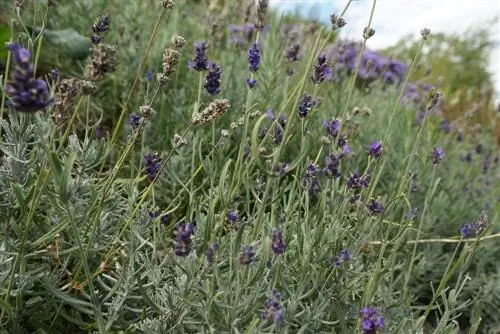
Lavender oils have long been used to successfully ward off ticks in animals. However, corresponding manufacturers also combine different essential oils with each other in such preparations in order to increase the effectiveness. Geraniol has proven to be particularly effective because it attacks the chitin shell of ticks and then dries out the animals. This oil is far superior to the lavender scent in terms of effectiveness, so geraniol should be preferred. However, lavender can also be recommended for temporary use.
A simple treatment method is to sprinkle a cloth with essential oils and then tie it around the animal. Dogs usually have the oil applied directly to their fur, but cats are more likely to react defensively at this point.
Caution:
Many animals experience hypersensitivity reactions when treated with essential oils. Therefore, the user should inform themselves in advance about the quality of the oil and whether it is suitable for the specific use on animals!
Lavender oil after insect bites
Lavender oil is not only suitable for repelling wasps - but also for treating wasp stings. The oil then develops the following effects:
- inhibits inflammation
- relieves the pain
- relieves itching
Since the anti-itching effect can be felt when applied to the skin, users also apply the oil after mosquito bites. After the sting, it is enough to drip two drops of pure lavender oil onto the affected area to achieve an effect.
Lavender oil - quality matters
High-quality lavender oil is expensive - but the use of such quality oils is particularly worthwhile if it is to be used directly on humans or animals. Then it is advisable to use natural, organic oils; These contain all the important ingredients that are important for tick defense. In addition, natural organic oils do not contain any additional chemical substances; For this reason, they are overall much more tolerable than comparable cheap oils and are less likely to cause intolerance reactions.
Conclusion
Lavender oil has a wide range of uses; It can be used as an insect repellent in the garden or on humans, as a plant or as an essential oil. A certain effect has now been proven - but it also has its limits. Whether lavender should be used must therefore be decided individually in each case.

